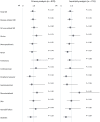Real-world data on vitamin D supplementation and its impacts in systemic lupus erythematosus: Cross-sectional analysis of a lupus registry of nationwide institutions (LUNA)
- PMID: 35767524
- PMCID: PMC9242469
- DOI: 10.1371/journal.pone.0270569
Real-world data on vitamin D supplementation and its impacts in systemic lupus erythematosus: Cross-sectional analysis of a lupus registry of nationwide institutions (LUNA)
Abstract
Background: Although vitamin D concentration is reportedly associated with the pathogenesis and pathology of systemic lupus erythematosus (SLE), benefits of vitamin D supplementation in SLE patients have not been elucidated, to our knowledge. We investigated the clinical impacts of vitamin D supplementation in SLE.
Methods: A cross-sectional analysis was performed using data from a lupus registry of nationwide institutions. We evaluated vitamin D supplementation status associated with disease-related Systemic Lupus International Collaborating Clinics/American College of Rheumatology Damage Index (SDI) as a parameter of long-term disease activity control.
Results: Of the enrolled 870 patients (mean age: 45 years, mean disease duration: 153 months), 426 (49%) received vitamin D supplementation. Patients with vitamin D supplementation were younger (43.2 vs 47.5 years, P < 0.0001), received higher doses of prednisolone (7.6 vs 6.8 mg/day, P = 0.002), and showed higher estimated glomerular filtration rates (79.3 vs 75.3 mL/min/1.73m2, P = 0.02) than those without supplementation. Disease-related SDI (0.73 ± 1.12 vs 0.73 ± 1.10, P = 0.75), total SDI, and SLE Disease Activity Index (SLEDAI) did not significantly differ between patients receiving and not receiving vitamin D supplementation. Even after excluding 136 patients who were highly recommended vitamin D supplementation (with age ≥ 75 years, history of bone fracture or avascular necrosis, denosumab use, and end-stage renal failure), disease-related SDI, total SDI, and SLEDAI did not significantly differ between the two groups.
Conclusions: Even with a possible Vitamin D deficiency and a high risk of bone fractures in SLE patients, only half of our cohort received its supplementation. The effect of vitamin D supplementation for disease activity control was not observed.
Conflict of interest statement
The authors have declared that no competing interests exist.
Figures
Similar articles
-
Severe vitamin D deficiency increases the risk for moderate to severe disease activity in Chinese patients with SLE.Lupus. 2016 Oct;25(11):1224-9. doi: 10.1177/0961203316635289. Epub 2016 Feb 25. Lupus. 2016. PMID: 26921268
-
The chronic damage in systemic lupus erythematosus is driven by flares, glucocorticoids and antiphospholipid antibodies: results from a monocentric cohort.Lupus. 2016 Jun;25(7):719-26. doi: 10.1177/0961203315627199. Epub 2016 Jan 27. Lupus. 2016. PMID: 26821965
-
Vitamin D Levels are Associated with Disease Activity and Damage Accrual in Systemic Lupus Erythematosus Patients.Biol Res Nurs. 2021 Jul;23(3):455-463. doi: 10.1177/1099800420983596. Epub 2020 Dec 30. Biol Res Nurs. 2021. PMID: 33380211
-
Childhood Systemic Lupus Erythematosus: Presentation, management and long-term outcomes in an Australian cohort.Lupus. 2022 Feb;31(2):246-255. doi: 10.1177/09612033211069765. Epub 2022 Jan 16. Lupus. 2022. PMID: 35037500 Review.
-
Vitamin D and systemic lupus erythematosus: continued evolution.Int J Rheum Dis. 2015 Feb;18(2):242-9. doi: 10.1111/1756-185X.12489. Epub 2014 Dec 19. Int J Rheum Dis. 2015. PMID: 25522756 Review.
Cited by
-
Systemic lupus erythematosus: latest insight into etiopathogenesis.Rheumatol Int. 2023 Aug;43(8):1381-1393. doi: 10.1007/s00296-023-05346-x. Epub 2023 May 24. Rheumatol Int. 2023. PMID: 37226016 Free PMC article. Review.
-
Vitamin D in Systemic Sclerosis: A Review.Nutrients. 2022 Sep 21;14(19):3908. doi: 10.3390/nu14193908. Nutrients. 2022. PMID: 36235561 Free PMC article. Review.
-
Differential impact of environmental factors on systemic and localized autoimmunity.Front Immunol. 2023 May 22;14:1147447. doi: 10.3389/fimmu.2023.1147447. eCollection 2023. Front Immunol. 2023. PMID: 37283765 Free PMC article. Review.
References
MeSH terms
Substances
LinkOut - more resources
Full Text Sources
Medical


